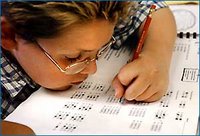Q: What two things do
H. H. Goddard, Francis Galton, Lewis Terman and Carl Brighan (father of the SAT) have in common?
A: 1) they were all members of the
eugenics movement (made famous by Adolph Hitler)...and….
2) They all were all pioneers of the standardized testing industry that our society is so very fond of today!
Yes, the prominent developers of the
IQ and other standardized tests advocated the selective breeding of “high grade” persons, believed that
intelligence was genetically predetermined, and that it, along with characteristics like mental illness and criminality, are correlated with race. Hmmmm……
Meanwhile, standar

dized testing has become a multi-billion dollar a year industry. The state of Florida, for example, spends at least 27 million a year contracting its standardized test the
FCAT, to a private company, McGraw-Hill to make and grade. Who knows how much all the test prep materials cost in addition to that “meager” fee (
the test prep package you see to the left cost $300.). The SAT costs 41 dollars a person to take, not counting the study aids, test score reports, and PSATs etc. AP tests are pricy as well, and each school gets additional funds for every student they have enrolled in an AP class. Then there are the GREs, SAT and GRE subject tests, the MCAT and the LSAT.
I don’t know about anyone else, but I can personally speak for the amount of money I dumped into the LSAT. First there was the 200 bucks to join the LSDAS (Law School Data Assembly Service)…this was not optional. Plus, it cost about $114 each time I took it. Then, there was the $12 score report sent to each school to which I applied. Plus study aids. This is not to mention the many, many very expensive test prep courses that are out there, the cheapest ones around $500.
My point? This is all a huge, money-making racket, with a sinister past and an
inequitable result. I for one am a strong believer that a person’s ability cannot be determined by their performance on a standardized test. There is a lot to be said for hard-work and det

ermination. What’s more, as a former educator, I am convinced that learning cannot be adequately assessed by some generic, timed, bubble-sheet test that contains tricky questions and unfamiliar language. Children today are over-tested and have lost their appreciation for learning. Education has become another chore, another forced performance in which they are judged, ranked and labeled beginning at very young ages. I am convinced that nothing psychologically harms young people more than labels.
Standardized testing will not solve educational problems, nor is it, in my humble opinion, an
adequate measure of future academic performance, despite what the industry-funded studies might say. How many teary-eyed straight-A students, did I console during my time as a teacher who came to me crying about their mediocre SAT scores? Would those same students go on to make fine grades in college? Yes. How sad am I that after their SAT scores came in, their perception of their own intelligence was forever changed. They were now officially average. Mediocre. The test had spoken.
This number would now follow them, and define them and their potential forever. Certain opportunities would not be available to them because of this number. Doors would close, either actually or in the child’s mind. How much of standardized testings’ “predictive ability” is merely just a self-fulfilling prophecy?
Today, many teachers have no choice but to teach tests instead of passing on a love for learning. Instead of teaching young people HOW to learn and HOW to truly THINK, analyze, and process ideas for themselves, we teach them to memorize the facts the system says are important so they can pass a test, boost school scores and then forget the information a few weeks later. We stifle creativity and independent thought because it doesn’t fit into our state-mandated curriculum guide. We reject the idea that not every kind of “smart” can be measured in an hour and a half with a number two pencil. We are failing our children.






















